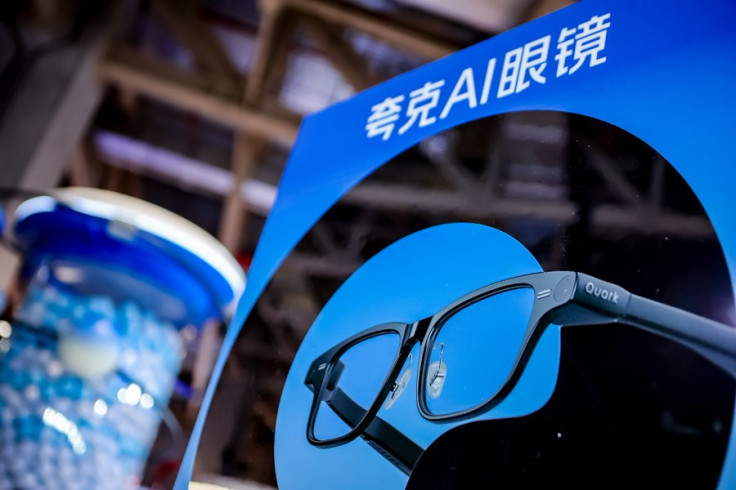Alibaba's Futuristic AI Glasses Just Hit the Market — And the Prices Are Turning Heads
The Quark AI Glasses bring real-time translation, navigation overlays, and smart payments to wearable tech enthusiasts

The Chinese tech giant Alibaba has stepped boldly into the global wearables race with the debut of its Quark AI Glasses, a lightweight pair of smart glasses powered by the company's own Qwen model.
The device, which lands in China this week with a starting price of 1,899 yuan (approximately US $268 or £202.51), has immediately grabbed global attention for bringing high-end AI capabilities to an everyday wearable that feels as natural as a pair of reading glasses.
Lightweight, powered by interchangeable batteries and built around a translucent display, the Quark AI Glasses mark Alibaba's biggest consumer-hardware shift in years — and suggest the tech giant sees AI wearables as the next frontier after smartphones.
What Are Quark Glasses And What Can They Do?
Quark Glasses run on Alibaba's own AI model, Qwen, and are designed to function more like an everyday wearable than a bulky VR headset.
According to specifications released by Alibaba, the flagship model—the Quark S1—features a translucent display embedded in standard-looking eyewear frames. It includes a built-in camera, bone-conduction microphones, dual‑chip architecture, and swappable batteries.
Among its promised capabilities: real-time translation across multiple languages, instant price and object recognition, navigation overlays, hands‑free calling and music, live transcription of meetings, and seamless integration with Alibaba's ecosystem, including payment via its affiliate mobile finance service and shopping on its widely used e‑commerce platform.
Alibaba says the design is light—the S1 weighs around 51 grams—and aims to combine comfort with everyday usability. The battery system is swappable, allowing extended use as users replace depleted batteries on the go.
Price Points: From Budget To Flagship
Alibaba appears to aim for a broad consumer base, not just early adopters or tech enthusiasts. The base model launches at 1,899 yuan, making it a relatively affordable entrée into AI wearables.
The more advanced S1 model, with a full display, dual‑chip capability, a camera, and the full suite of AI functions, is priced higher, matching premium wearables in the current market.
That dual pricing strategy, budget‑friendly vs. feature‑rich, suggests Alibaba hopes to reach everyday consumers as well as prosumers who may value full AI functionality for work or creative use.
Why It Matters: Wearables, AI & A Major Leap By Alibaba

With Quark Glasses, Alibaba is making a bold push beyond its traditional domains of e‑commerce, cloud computing, and online services, into hardware that sits on your face. This marks a significant strategic shift and shows how the company sees AI as the next frontier for consumer technology.
The move also pits Alibaba directly against global rivals venturing into smart glasses and mixed‑reality wearables. Companies such as Meta and Xiaomi have previously introduced their own AI glasses or AR eyewear, signalling that consumer adoption of such technologies may be accelerating.
Industry analysts note that integrating AI and familiar mobile‑device functions (such as payments, translation, and navigation) into lightweight glasses could accelerate adoption, particularly among users already embedded in Alibaba's ecosystem.
What Consumers Should Know And What's Still Unclear
While the Quark Glasses promise impressive functionality, potential buyers should remain realistic about what a first‑generation wearable can deliver. Battery swapping improves usability, but extended continuous use could still be limited; the advertised battery life suggests some compromises between performance and endurance.
Furthermore, the product is currently available only in China. There is no confirmed international release date or pricing for global markets, meaning anyone outside China must wait before deciding whether to import or wait for an official launch.
Integration with Alibaba's apps, such as its payment service and e‑commerce platform, provides a strong incentive for users already active in that ecosystem. But for users outside China or outside Alibaba's services, the value proposition may be reduced.
The Launch of Quark AI Glasses: A Glimpse Into Tomorrow
With the launch of Quark AI Glasses, Alibaba is placing a substantial bet on AI wearables as the next central platform beyond phones and laptops. Their pricing, from affordable to premium, and the range of AI‑powered features show ambition, but also reflect the challenges of making smart glasses mainstream.
If the device delivers on promises of seamless AI assistance, real‑time translation, immersive data overlays and everyday convenience integrated with an existing digital ecosystem, it could herald a new era in how we interact with technology, one where 'computing' is always with us, as light as a pair of glasses.
Whether Quark Glasses becomes a global trend or remains a niche product depends on broader adoption, international rollout, and how well Alibaba can maintain performance, privacy, and utility over time.
© Copyright IBTimes 2025. All rights reserved.




















